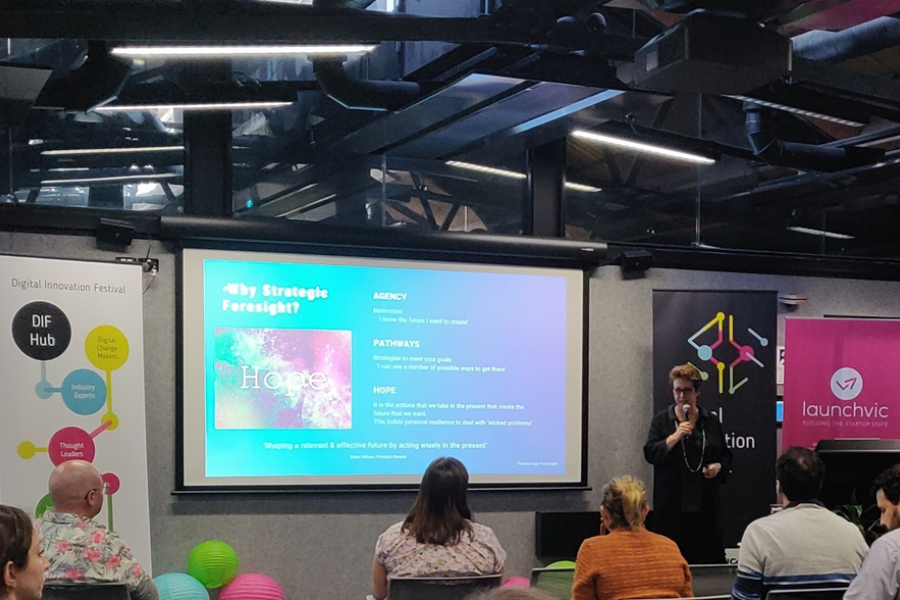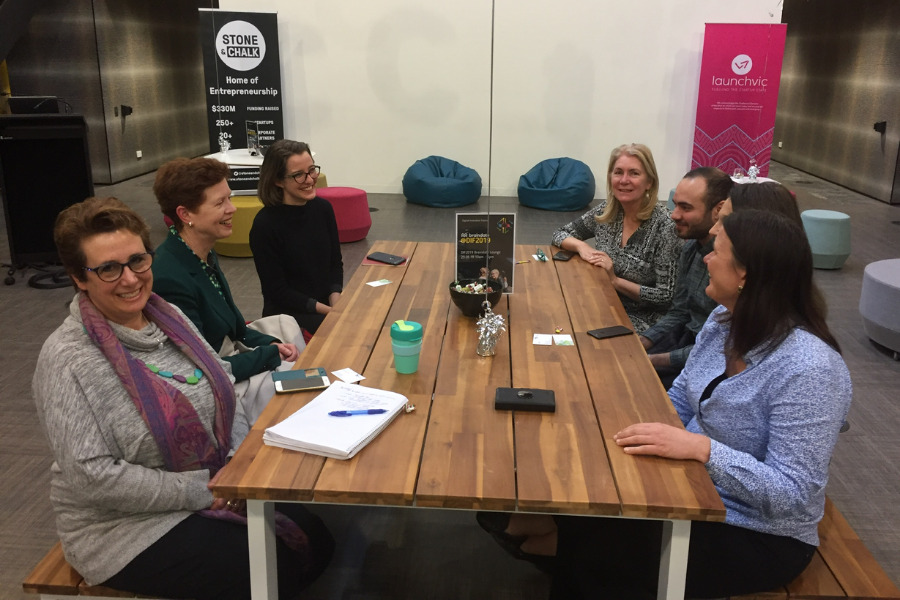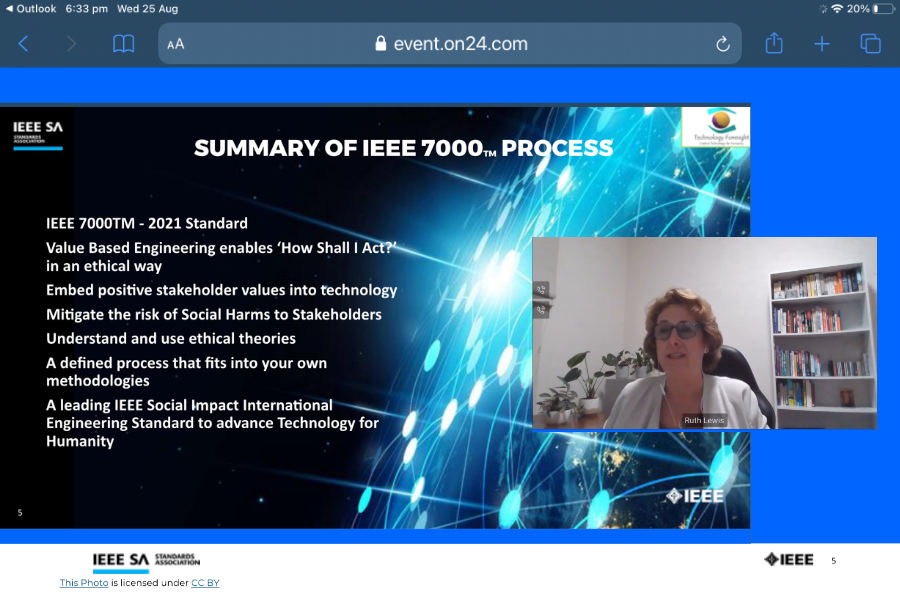People who make the DIF: Ruth Lewis

Leveraging Technology for a Better Tomorrow
As part of IEEE Day we spoke to Ruth Lewis, Chair of the IEEE Society for Societal Implications of Technology (SSIT), Standards Committee, on her contribution to the development and launch of the new global standard IEEE 7000TM Model Process for Addressing Ethical Concerns During System Design. This standard establishes a set of processes by which organizations can include consideration of human ethical values in the design of IT and AI systems.
Ruth's career has spanned 30 years developing and designing IT solutions for her clients, as an experienced strategic IT consultant, Futurist, network engineer, solutions architect, and business analyst. Ruth’s passion is to work towards the ethical development and use of technology for the good of society, enabling her clients to make wise and informed decisions and investments today to enable their preferred futures. Through her firm, Technology Foresight, Ruth provides responsible, ethical and sustainable Information Technology consulting services to assist businesses, governments and NGOs in realising their values through technology evolution.

AI Futures was a theme across the DIF2019 Festival, prompting Ruth (left above) to post a Braindate on Ethics and AI. This sparked conversations with the Victorian Lead Scientist (above seated next to Ruth) and others interested in the challenges facing society's successful adoption of emerging technology. Through meeting the DIF team, Ruth was invited to be a panellist on the DIF Hub AI futures day Solving Global Problems: Data, AI and Future Systems session. Ruth shared the importance of Strategic Foresight in preparing us for the future.
Ruth then joined The Pearcey Institute roundtable 'Is Your Industry AI Ready?' Given her work with IEEE standards, Ruth connected with Greg Adamson, Chair, IEEE Ad Hoc Committee on IEEE Ethics Programs, and is representing Australia on this important international body. Since then, Ruth has kept in touch with the DIF team and it's great she came back in for 2021.
IEEE Launches New Standard to Address Ethical Concerns During Systems Design
For this year's DIF2021 Festival, Ruth presented a worldwide exclusive preview of this pioneering standard at Engineering Collective Wisdom: The Value of Ethically Aligned IT Standards on Wednesday 25 August ahead of the release worldwide on 15 September 2021. A video on demand of this webinar is available from the IEEE website.

How is an IEEE Standard Developed?
This particular standard has been nearly 6 years in the making and Ruth has worked on both contributing to the content and being part of the comments resolution team. “It’s a very formalised process and it’s voluntary so you can either observe the process or jump in and spend hours working on it”, says Ruth
There is a large and diverse worldwide group of people who have contributed to this standard, “Along with IT and tech, there are a lot of academics involved in the process of creating the standard, people from sociology and legal, and many diverse backgrounds”, says Ruth. The general public is also a huge stakeholder, particularly as the standard offers a form of soft law, one that considers how your personal data and information is used.
Part of the process is responding to the comments from the general Working Group, of which there were over a thousand. Once all the comments are effectively responded to there are many rounds of voting within the Working Group to decide if the standard is complete and ready to be published.
In terms of how this standard could affect IT design, Ruth says it’s about thinking more laterally around the dimensions of the problem that IT is trying to solve. This involves not only thinking about the end-user, a direct customer, but also anyone that may be affected or touched by the system or the data used, and that it should benefit people, not harm them.
“If you are used to the worldview of striving for useability, process and cost efficiency outcomes for IT, then you won’t necessarily think beyond those goals. However, many IT people are now starting to understand the societal implications of their work and some of the ethical harms that IT and AI may introduce, and are not sure what to do about it.” - Ruth Lewis
Ruth describes the standard as a toolset, an additional layer to consider, when developing IT and AI and believes, as a user, you should expect and demand IT developed on values and ethical principles of the society or community you want to live in.
Who Will Use the IEEE Standard?
IEEE 7000-2021 is recommended for use by organizations that seek to apply broader ethical value criteria and minimize risk, thereby helping to strengthen relationships with their end-users and customers. Organizations may apply this first-of-its-kind standard across multiple levels including concept exploration, system requirements definition, or development of new or revised products or services.
“Engineers, their managers, and other stakeholders benefit from well-defined processes for considering ethical issues along with the usual concerns of system performance and functionality early in the system life cycle. End users can be unaware of the ethical considerations regarding the products and services they use; this is why IEEE supported the launch of the IEEE 7000 series of standards including this standard that also complements our Ethics Certification Program for Autonomous and Intelligent Systems (ECPAIS) certification criteria offering. It is only by rigorously prioritizing ethical concerns at the outset of design that manufacturers, engineers, and technologists can responsibly align products and services with results honoring the contextual values of customers, citizens, and society at large.” - Konstantinos Karachalios, Managing Director, IEEE SA
A key part of digital transformation provided by IEEE 7000-2021 comes in addressing risk. Where traditional evaluations of technological risk may focus largely on areas of physical harm, the VbE methodology provides a broader lens to consider also potential value harms associated with product or systems design. This makes the standard unique and deeply important in terms of ease of adoption of applied ethics methodologies in emerging technologies such as AI. The use of this standard could help organizations better earn and keep the trust of end-users and stakeholders by directly addressing ethical concerns upfront, leading to greater market acceptance of their products, services, or systems.
The Chicken or the Egg Syndrome
In relation to last year’s popular Netflix docudrama The Social Dilemma (2020), which focuses on how social media companies use algorithms to manipulate and encourage addiction to their platforms, Ruth believes the problem with technology is more complex and refers to what she calls the Chicken and Egg Syndrome,
“… in discussing ethical and IT issues with it, Netflix’s ‘Social Dilemma’ doesn’t go far enough to explain the problem with IT and the solutions. I would like to see a discussion of the chicken and egg syndrome, which came first the IT products and industry feeding the users as chickens, what they want us to have, or the users seeking more of the same poor-quality choices with their IT services from an ethical point of view”. - Ruth Lewis
As Chair of the SSIT Standards Committee, Ruth says there is a growing list of developing standards under this one. This includes a developing standard on the Provenance of Indigenous People’s Data, meaning Indigenous populations all over the world will have ownership and management rights over their data. This standard has an Indigenous Caucus of contributors that includes Australian and New Zealand Indigenous communities.
Much like the trend to invest in Ethical, Sustainable, and Governance (ESG) superannuation and investment funds, Ruth is hoping that investors in IT and AI development will consider the factors of ESG when investing in new design and procurement. She sees the standard as ‘not a constraint but a stimulus’, a way to help change people’s mindset and give them new tools and skills, as well as being a great opportunity for the Australian tech industry to create innovative products and services that will benefit Australians long term.
About the IEEE
IEEE and its members inspire a global community to innovate for a better tomorrow through highly cited publications, conferences, technology standards, and professional and educational activities. IEEE is the trusted “voice” for engineering, computing, and technology information around the globe. For more information, visit ieee.org.
IEEE Standards Association (IEEE SA) is a collaborative organization where innovators raise the world's standards for technology. IEEE SA provides a globally open, consensus-building environment and platform that empowers people to work together in the development of leading-edge, market-relevant technology standards, and industry solutions shaping a better, safer and sustainable world. For more information, visit standards.ieee.org.
IEEE Society on Social Implications of Technology (SSIT) The society's Field of Interest is the impact of technology on society, including both positive and negative effects, the impact of society on the engineering profession, the history of the societal aspects of electrotechnology, and professional social and economic responsibility in the practice of engineering and its related technology. SSIT provides forums to address the challenges and opportunities the application of technology can have for our world. The society publishes an award-winning magazine entitled IEEE Technology & Society Magazine - view the current issue here. For more information, visit technologyandsociety.org/
IEEE Day celebrates the first time in history when engineers worldwide and IEEE members gathered to share their technical ideas in 1884. Worldwide celebrations demonstrate the ways thousands of IEEE members in local communities join together to collaborate on ideas that leverage technology for a better tomorrow. Now engraved in its essence, the IEEE Day’s theme is: “Leveraging Technology for a Better Tomorrow”. While the world benefits from what’s new, IEEE focuses on what’s next. For more information visit ieeeday.org

IEEE Victoria presents IEEE Day Event 5 October at 5pm
IEEE Victorian Young Professionals STEP 2021
IEEE Victorian Young Professionals (IVYP) would like to invite you to our flagship event - STEP Student Transition and Elevation Partnership.
The event is being run as a series of events over the next few months, starting with events combined with IEEE Day Celebrations on Oct 5.
AGENDA
5-6pm AEDT: Industry Panel Discussion on Engineering Job Market
6-6:30pm: Introduction to YP and How to volunteer with YP
6:30-6:45pm: Introduction to IEEE Xtreme
PANELLISTS
- Javad Jazaeri: Platform Engineer, AGL Energy
- Sameer Ramgoolam: Director, SMARTBuild Engineering
- Jane McCarthy: Data Area Lead, ANZ
- Chrispin Gray: AI Technical Specialist, IBM Australia
Upcoming Events
- Health and Fitness for the Youth During COVID
- Blogging Contest
- Industry Panel Discussion on Building Career in a Post-COVID Era
- Tools to Improve Efficiency






